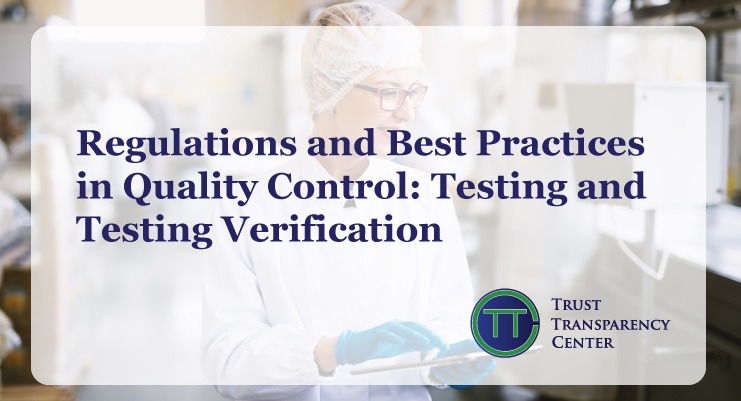Continuing the discussion regarding the fundamentals of regulatory compliance in the current US dietary supplement universe, we present a rationale and outline of testing practices, including third party testing, not only to comply with the regulations under cGMP, but also to minimize risk and maximize operational control of third-party contractors. While targeted at industry as a whole, these practices are especially important and intended specifically at the emerging Internet-first brands dominating the online landscape.
Introduction
It’s probably quite obvious that the establishment of specifications and for testing of ingredients are requirements for Good Manufacturing Practices (GMP) manufacturing of dietary supplements. With the role of the
contract manufacturer increasing as a third-party support for online only
brands, these manufacturers play a role in ingredient and product testing. The
question is where to go from there.
Issue
The premise behind dietary supplement GMPs is that all products are manufactured in an environment that assures safety and purity of product, and follows established processes and procedures that are documented, in order to produce consistent, reliable product. The cGMPs are guidelines, and while they describe what you must have in place, they are not specific often in the ‘how’s’. Both brands and contract manufacturers are required under 21 CFR Part 111 to ‘Establish adequate specifications for finished products and dietary ingredients’. On both the ingredient and finished products side, this means specifications for purity, strength, composition, and limits on contaminants for each component or product.
Context
Typical language associated with 483’s describing deficiencies includes language such as “…You failed to establish specifications for identity, purity, strength, composition, and limits on contaminants for each component used in the manufacture of your dietary supplements, as required by 21 CFR 111.70(b)….”; while those related to finished dietary supplements typically indicated “…You failed to establish product specifications for the identity, purity, strength, and composition of the finished batch of the dietary supplement, and for limits on those types of contamination that may adulterate, or that may lead to adulteration of, the finished batch of the dietary supplement, as required by 21 CFR 111.70(e)….”
In the pre-GMP days, manufacturers frequently relied on suppliers Certificates of Analysis (COA) to support ingredient identity and many other specifications. With the implementation of the dietary supplement GMPs in 2004, the supplier COA by itself was deemed inadequate. The brand/manufacturer was required to confirm identity of ingredients.
Finished dietary supplements must also be tested; the rule though, does not require testing of every batch. The manufacturer may test every batch if it chooses to do so, or, the rule permits testing “subsets of finished dietary supplement batches.” In this case it is up to the manufacturer to determine testing frequency. In this case a statistically valid sampling plan would be used to define the subset where the manufacturer is testing against one or more of the product’s specifications for identity, purity, strength, and composition.
Relevance
It is clearly both the brand holder’s and contract manufacturer’s responsibility to perform this testing. Care must be taken to establish specifications in the first place, and the contract and understanding between the brand holder and manufacturer must be very clear as to what happens when specifications are not met, and rare circumstances that may cause a specification change. Many brand holders rely on the contract manufacturer to perform all testing that they can in-house, and to further test using contract labs for those tests that require such capability. The brand holder should know what tests are being done where, should receive all analytical results, including off-spec results, should be able to verify all lot information to trace raw materials through finished products, and should have inspected both in-house and the manufacturer’s third party labs (dry-labbing, the practice of rubber-stamping material as on spec without performing the actual tests) does exist in the US dietary supplement market and represents a significant brand-holder risk). The brand-holder QA role should formally release material meeting all specifications.
Many brand-holders themselves contract third party labs to verify the work done on their behalf by contract manufacturers. While an additional cost, this is, in general, good practice, especially when performed for both ingredients and finished products. Specifically, where the brand-holder has identified a particular raw material source that may not be a customary recommendation by or a supplier of the contract manufacturer, prudent risk management would suggest third party testing prior to release.
Again, skip lot testing in general, in third party facilities, would be a practical approach to quality assurance and risk management of contract manufacturing operations.
What you can do
As a brand-holder, establish and verify your own ingredient and product specifications. Where using contract manufacturer specifications on either ingredients or finished products, inspect and verify supplier performance, ingredient failure, finished product testing and finished product failures.
Find a qualified testing lab that can perform all required analytical procedures as your own third party contractor, and perform regular audits of lab operations.
Question your contract manufacturers regarding all lab operations including their third-party contractors. Audit all labs, including third party labs.
Resources:
Sample Skip Lot Testing Program
Finished Product skip lot testing shall have two (2) categories; single lot receipts and multiple lots per item receipts.
Skip Lot frequency is defined as
1. Single lot receipts:
1.1. Skip lot testing requirements are based upon the following criteria:
1.1.1. Vendor performance.
1.1.1.1. Vendor must be qualified and approved as a XXXXXX supplier.
1.1.1.2. Vendor performance has shown no out of specification results for the individual product for a trailing period of one (1) year and or at minimum three (3) product production cycles.
1.1.2. Frequency of receipts or reorder.
1.1.2.1. Product must have projected reorder cycle equal to and or exceeding three (3) receipts per year and each of the three (3) received lots of product shall have been tested and passed in accordance with XXXXXXX specification.
1.1.3. Testing frequency: Full testing will be required on the projected fourth (4) projected receipts from the last tested lot. Note: If issues are noted at receipt of product, full or limited testing may be required at the discretion of Quality.
2. Multiple lot receipts:
2.1. Based upon vendor capacity, multiple lots of finished goods on a purchase order may be received on the same day or over a period of days. The following criteria applies:
2.1.1. Vendor and product meets criteria in 1.1.1, 1.1.2 and 1.1.3.
2.2. Only one receipt or individual lot will be tested if the received product falls within the skip lot testing criteria.
2.3. Testing will not be performed if the received product with multiple lots meets the frequency requirement established in 1.13.
There are as many ways to meet the requirement for the cGMP testing as there are brands required to do so. The importance of establishing and maintaining a testing program cannot be understated,






